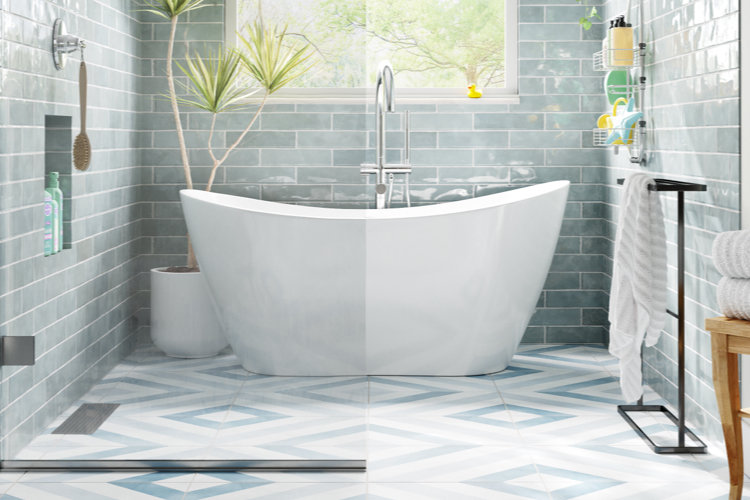What Size Tile is Best for a Small Bathroom?
Tile sizes to make a small bathroom stand out.
The right tile size creates an open and polished bathroom. Unsure which dimensions are ideal for your home? Keep reading for an overview of the tile sizes that work best in small spaces so you can create a balanced bathroom layout.
Best Tile Sizes for Small Bathrooms
When square footage is limited, tile size makes a big visual impact on your bathroom. While there’s no universal solution, here are the tile sizes that typically work best in snug bathroom spaces:
Large Tiles (13 x 13 & Up)
(Shop this image: Marble bathroom tile, wood bathroom vanities, , vanity light fixtures, and shower & bathtub doors)
While using larger tiles in a small bathroom may seem counterintuitive, sizes like 13" x 13", 18" x 18", and 24" x 24" can actually make your space feel bigger. Larger tiles require fewer grout lines, creating a polished and continuous look that makes your bathroom feel more open. Rectangular selections, like 12 x 24 and 18 x 24 tiles, are other great choices for elongating compact spaces – their extended shape draws the eye, creating the illusion of a wider or longer bathroom depending on your tile placement.
Tip!
Check out these 7 Tile Ideas for Small Bathrooms that will make your space feel bigger.
Medium Tiles (6 x 6 to 12 x 12)
(Shop this image: Green bathroom tile, patterned floor & wall tile, wood bathroom vanities, gold bathroom & vanity mirrors, and shower & bathtub doors)
For a balanced bathroom aesthetic, choose square tiles in standard sizes like 6" x 6", 8" x 8", or 12" x 12". Not only can these medium-sized selections be installed on both floors and walls for a uniform look, but they can anchor smaller spaces without making them feel busy. These tiles are best used in cohesive grid patterns.
Small Tiles & Mosaics (Under 4 x 4)
(Shop this image: Blue mosaic floor & wall tiles, black bathtubs, and blue pendant lighting)
Small tile dimensions like 1" x 2", 2" x 2", and 4" x 4" are perfect for adding texture and a personal touch to smaller bathrooms. They work best when used in areas like accent walls, shower floors, or decorative backsplashes – covering an entire bathroom floor with small tiles can be a daunting task and leave your space feeling visually cluttered. Instead, selectively use this tile size to give your small bathroom a few pops of interest.
Tip!
Check out our guide on Popular Tile Sizes for more information on every option.
Unique Shapes & Sizes
(Shop this image: Subway floor & wall tiles, wood towel stands, wicker & rattan benches, and white hand towels)
Unique tile sizes like subway tile or herringbone layouts are ideal for those who have a particular aesthetic in mind for their small bathroom. Sizes like the classic 3" x 6" tiles featured above, 4" x 12" tiles, and 6" x 36" tiles help to achieve a clean and modern bathroom look. From traditional layouts to creative designs, these options offer flexibility during installation while adding texture and dimension to your space.
Tip!
Browse our guide on Subway Tile Sizes for a breakdown on achieving this dynamic look.
Tips for Choosing the Right Tile Size
Tile size can make or break the bathroom design you’re aiming for, particularly when space is limited. Keep the following factors in mind to the best choice for your home:
1. Consider Visual Flow
Too many grout lines can visually overwhelm your bathroom and create a cluttered look. To avoid a busy appearance, choose larger tiles to create an open and continuous feel.
2. Match Scale to the Bathroom
While larger tiles can visually expand the bathroom, they’re best used if they suit the scale of your space. In bathrooms with open layouts and minimal fixtures, larger tiles create a seamless look and reduce grout lines. However, in bathrooms with many fixtures or tight angles, small- or medium-sized tiles may be a better option for visual harmony.
3. Strategically Lay Your Tiles
The design and direction of your tiles can significantly affect your bathroom’s look. Lay rectangular tiles horizontally to widen the space, or install them vertically to draw the eye upward and create the illusion of taller ceilings. No matter what you choose, base the orientation around the effect you want to achieve.
4. Balance Texture & Patterns
Less is more when it comes to tiling small bathrooms – it’s important to thoughtfully balance pattern and texture for an open and airy feel. Avoid overwhelming the space by limiting yourself to one or two tile sizes and finishes. This approach prevents your bathroom from feeling cluttered while maintaining a cohesive design.
5. Test Before Committing
Before choosing a tile size, test a few samples within the bathroom. You may initially be drawn to one choice, but your space’s shape, color scheme, and lighting can affect the tiles’ overall appearance. To finalize your decision, lay out a few options to see exactly how the tiles look within your bathroom.

